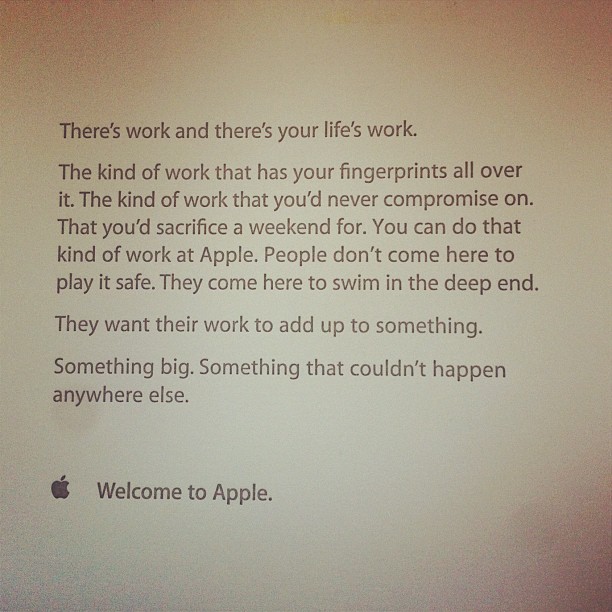Welcome to Apple

iMore offers spot-on advice and guidance from our team of experts, with decades of Apple device experience to lean on. Learn more with iMore!
You are now subscribed
Your newsletter sign-up was successful
The note Instagrammed above and quoted below greets new Apple employees on their first day of work. That's not a new revelation, but seeing it turn up again online is a great reminder. Apple sweats a lot of little details. From day one.
There is work and there is your life's work.The kind of work that has your fingerprints all over it. The kind of work that you never compromise on. Thought you'd sacrifice a weekend for. You can do that kind of work at Apple. People don't come here to play it safe. They come here to swim in the deep end.They want their work to add up to something.Something big. Something that couldn't happen anywhere else. Welcome to Apple.
That sense -- that Apple is working on things that are insanely great, that will dent universes -- was deliberately made part of Apple's corporate culture during the Steve Jobs era, and is something the current executive team no doubt wants to maintain.
Ultimately, whether you find it inspirational or cultish, it's proven effective, over and over again, every time Apple ships a new device or announces record results.
Often in modern companies employees aren't instilled with a sense of value. Their individual contributions are recognized and they aren't made to feel as if they matter. Sometimes they're deliberately made to feel like they don't matter, like they're an insignificant cog in a giant wheel, expendable and always replaceable. That products are part of an assembly line, a unending conveyer belt of beige boxes. A machine.
There's no shortage of stories about Steve Jobs and Apple utterly annihilating employees, or about the stresses and pressures endured by those who work at Apple.
But on the first day, when employees are new and expectations are set, they're told they can change the world at Apple. And that's a tremendously powerful message.
Source: M via @nickbilton,
iMore offers spot-on advice and guidance from our team of experts, with decades of Apple device experience to lean on. Learn more with iMore!

Rene Ritchie is one of the most respected Apple analysts in the business, reaching a combined audience of over 40 million readers a month. His YouTube channel, Vector, has over 90 thousand subscribers and 14 million views and his podcasts, including Debug, have been downloaded over 20 million times. He also regularly co-hosts MacBreak Weekly for the TWiT network and co-hosted CES Live! and Talk Mobile. Based in Montreal, Rene is a former director of product marketing, web developer, and graphic designer. He's authored several books and appeared on numerous television and radio segments to discuss Apple and the technology industry. When not working, he likes to cook, grapple, and spend time with his friends and family.
